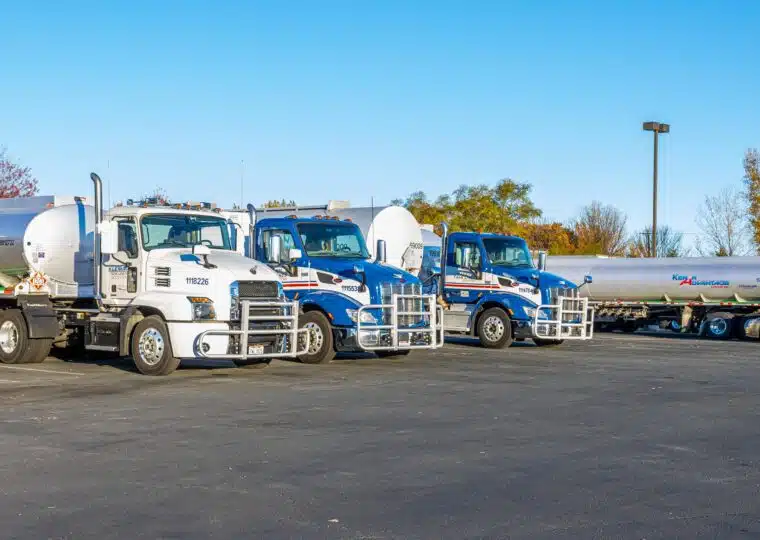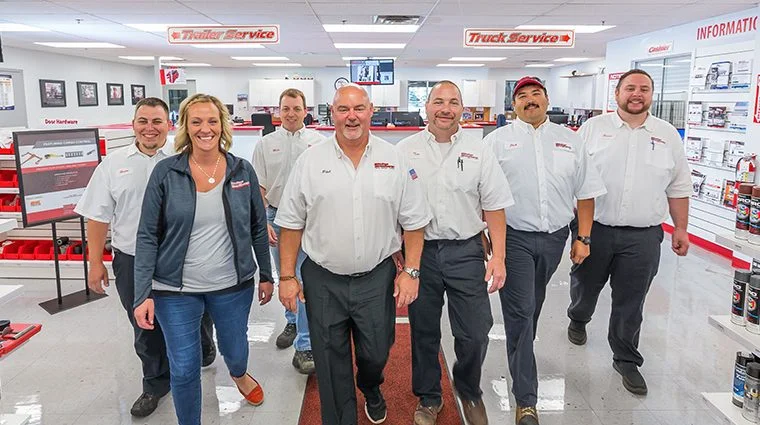There are many moving parts when it comes to keeping your trucks operating safely on the road, but in the end, everything comes down to fleet management. When you think of it that way, it makes complete sense.
After all, if you’re not taking good care of your vehicles through maintenance programs or adding to your fleet’s inventory by purchasing new trucks, you run the risk of putting yourself at a disadvantage in terms of safety, efficiency and profitability. That’s why understanding all the ins and outs of fleet management is so critical.
In this blog, we’ll explore the question “what is fleet management?” and break it down to give you a greater understanding of what it means for you as a trucking and transportation professional.
What is fleet management?
Quite simply, fleet management is a function that allows companies in transportation-related industries to reduce costs, improve efficiency, safety and productivity and minimize investment risks – among other tasks – under the oversight of a fleet manager or fleet management company.
 Why is fleet management so important?
Why is fleet management so important?
When you’re trying to run a trucking and transportation business, there are tons of things to keep up with and dropping the ball on any of them can mean irreversible damage to your reputation. You’re trying to coordinate delivery schedules, build relationships with new customers and keep your current customers happy. Plus, you’re probably also dealing with matters related to your employees such as hiring, onboarding and payroll.
But when it comes right down to it – where the rubber meets the road, so to speak – nothing will happen at your company if your fleet isn’t running efficiently and your drivers are unsatisfied. And as your company grows, the amount of work and money that goes into keeping your fleet operating at optimal performance will continue to get higher. This is when some companies will look to outsource some – or maybe all – of their fleet management tasks to a fleet management company.
With the fleet management market projected to be worth nearly $34 billion by 2026, it’s obvious that fleet management has become an extremely important part of the industry.
What is a fleet management system?
These days, we’re more reliant on technology than ever before, and the trucking and transportation industry is no exception. This is where fleet management systems come in. First, let’s define what a fleet management system is. It is an online platform that helps fleet managers track and manage vehicles and personnel.
A good fleet management system provides them with a quick and easy way to keep tabs on critical performance metrics such as mileage logs and maintenance costs while monitoring real-time activity including driver and technician productivity. By having access to this valuable data, the fleet manager is empowered to make more informed decisions that can save the company time and money.
How fleet management systems operate
Fleet management systems are composed of many parts, all of which work together to give fleet managers the big picture of what’s going on in the company. Here, we’ll talk about two of the most important ones.
First, there’s the software component, which does the majority of the heavy lifting. Fleet management software can do everything from running reports on expenditures to creating schedules for shipping to communicating with drivers and much, much more. Plus, it can be set up to alert you and your team members when it’s time to perform routine maintenance services.
It can also help you manage your inventory and can be programmed to place automatic orders when supplies of critical equipment are low.
Second, fleet management systems use telematics. Telematics combines GPS navigation with on-board diagnostic sensors. The information provided through telematics can be a game-changer for trucking and transportation companies because it can shed light on a variety of important metrics.
Are your drivers taking longer on deliveries than they should? Telematics can pinpoint the exact location of all your vehicles in real-time so you can determine if your drivers are moving at a productive pace.
Additionally, telematics can provide information on how the driver is operating the vehicle. Is he braking too fast? Tailgating? Taking a turn too wide? You can use this information during the driver’s next performance review to talk to him about safe operating procedures and potential areas of improvement or to praise him on a job well done.
What is the role of a fleet manager?
Just like managers of supermarkets or other retail businesses, fleet managers wear many hats. At their core, they are logistics experts who oversee all aspects of a fleet to ensure it is running as smoothly and efficiently as possible. Their responsibilities include everything from analyzing data to tracking vehicles to human resource-type tasks such as driver safety and retention. They’re also in charge of financing and purchasing vehicles and setting up fleet maintenance programs and schedules.
Typically, fleet managers have experience in both driving and logistics roles and they’re known to be detail-oriented problem-solvers with excellent interpersonal skills. For all these reasons and many more, good fleet managers are worth their weight in gold.
What does fleet management include?
Whether you’re handling fleet management in-house or outsourcing it to a fleet management company, there are a number of common activities that fall under the umbrella of fleet management. Here are a few of them:
Fleet maintenance
Fleet maintenance is what most people think of when they think of fleet management, and for good reason. It’s a huge part of the job and perhaps the most important. Fleet maintenance involves the development of thorough and detailed processes that ensure that all vehicles in the fleet are in tip-top shape and ready to hit the road reliably and safely.
By creating a solid schedule of fleet maintenance activities that includes regularly checking tire pressure, replacing air filters, and monitoring heating and air conditioning systems, fleet managers can avoid dealing with unexpected and costly repairs. It’s the best way to ensure vehicles stay in good operating condition and that deliveries stay on schedule.
Fleet tracking
It’s pretty hard to manage your fleet if you don’t know where your vehicles are or how they’re being operated. Fleet tracking, which typically involves the use of sensors, GPS, cameras, AI, and diagnostic systems, not only keeps tabs on the physical location of vehicles in real-time but can also provide valuable information on the vehicle’s condition.
Using the data gathered by fleet tracking software, fleet managers can study fuel usage, create invoices and analyze patterns and anomalies that could be indicative of potential problems.
Safety and compliance
As anyone in the trucking and transportation industry knows, safety is everything. While no fleet manager will be able to prevent every accident from happening, implementing a safety checklist based on mileage or hours on the road can go a long way in ensuring that seat belts are in good shape, braking and steering systems are working correctly and everything else is functioning as it should be.
Additionally, fleet management can keep you covered in terms of compliance by making sure vehicles are ready for state and federal inspections. This is huge when you consider the costly fines you can incur for not being in compliance, not to mention the service disruptions for your clients that can be extremely harmful to your reputation.
Cost management
Operating a fleet isn’t cheap, but without a proper fleet management system in place, costs can quickly get out of hand. By using fleet management software, fleet managers can get a handle on expenses by being able to monitor expenses associated with insurance, maintenance, fuel costs, and wages. They can then use the data they gather to figure out where modifications can be made and track those modifications to see if they’re saving the company money.
Truck acquisition
As companies grow, they need more vehicles to help meet customer demand. But it can be difficult to predict exactly how many vehicles are enough and while it’s tempting to buy as many as you can afford, that’s not exactly a good business practice. You could end up with more vehicles than you need and the upkeep could end up costing an arm and a leg. With an established fleet management system, fleet managers are able to come up with a purchase strategy that makes sense for the company.
Instead of simply guessing, they’ll be able to use data and their own personal experience to make informed choices on what to buy (or lease) and when to buy it.
 Take the first step toward better fleet management
Take the first step toward better fleet management
When you’re ready to move forward and implement a new and improved fleet management system, Blaine Brothers is here and ready to help you on every mile of your journey. Our team of experienced fleet management experts is 100 percent committed to providing top-notch, customized services at competitive prices to companies of all sizes.
As one of the most trusted names in the trucking and transportation community in the upper midwest, our knowledge and expertise is unsurpassed and the support and service we provide will keep your fleet running smoothly, safely, and efficiently for many miles to come. This is how we’ve been doing things for more than 40 years. Why? It’s simple. We firmly believe in treating our customers like members of our family and seeing them succeed is our greatest reward.
We look forward to continuing our tradition of excellence for many years to come and we can’t wait to show you the Blaine Brothers difference. Contact us now to learn how we can help with all your fleet management needs.


 Why is fleet management so important?
Why is fleet management so important?
 Take the first step toward better fleet management
Take the first step toward better fleet management